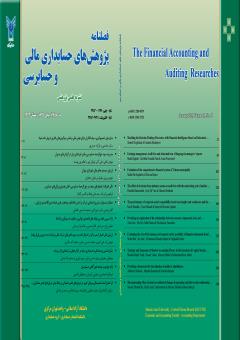Modeling the Decision Making of Investors with Financial Intelligence Based on Behavioral Biases Using the Grounded Method
Subject Areas :
setareh moghadasi
1
,
فرزانه حیدر پور
2
![]()
1 -
2 - گروه حسابداری، واحد تهران مرکزی، دانشگاه آزاد اسلامی، تهران، ایران
Keywords: Financial Intelligence, Behavioral Biases, Cognitive Biases, Grounded Theory Method,
Abstract :
This study aims to present a comprehensive and practical model for decision-making by financially intelligent investors based on behavioral biases (cognitive and emotional) in the Iranian capital market. To achieve this goal, various aspects of this topic have been examined from different perspectives. In the field of decision-making by financially intelligent investors, most research has been quantitative, with only a limited number of qualitative studies focusing solely on financial intelligence. This qualitative study investigates both financial intelligence and behavioral biases. Using grounded theory, the impact of behavioral biases on the decision-making of financially intelligent investors for stock selection in the Iranian stock market was modeled. To more precisely examine each parameter of this study (financial intelligence and behavioral biases), the researcher conducted all interviews separately in two distinct stages, once for the financial intelligence parameter and once for the behavioral biases parameter, performing open and axial coding. Finally, using selective coding, all extracted categories of both mentioned parameters led to the formation of the paradigm model of decision-making by financially intelligent investors. This modeling can help better understand investor behavior and improve their financial decision-making. The present study helps financially intelligent investors gain a better understanding of the impact of behavioral biases on their decision-making and, as a result, increase their investment returns by making optimal decisions.
روشنگرزاده امیر، دستگیر محسن، ساعدی رحمان (۱۴۰۳). تأثیر سواد مالی بر سوگیری های رفتاری بازنمایی و لنگر انداختن و تحلیل اثر آنها بر عملکرد سرمایه گذاران در بورس اوراق بهادار تهران با استفاده ازالگوهای ناپارامتریک معادلات ساختاری. پژوهش های حسابداری مالی و حسابرسی
محمد واحدانی، جواد محمدی مهر (۱۴۰۲). ارتباط بین گزارشگری مالی یکپارچه با سوگیری پیشبینی سود و آگاهی دهندگی قیمت سهام. پژوهش های حسابداری مالی و حسابرسی
ترازودار میترا، قاسمی مصطفی، محسنی عبدالرضا (۱۴۰۲). ارایه مدلی به منظور شناسایی تورش های رفتاری و سواد مالی و نقش آن بر تصمیم گیری سرمایهگذاران. مجله دانش حسابداری.
نایب محسنی شیدا، خلیفه سلطانی سیداحمد، حجازی رضوان(۱۴۰۰). تدوین مدل سرمایه گذاران فردی در بازار سرمایه ایران. مجله تحقیقات مالی.
بینشیان زهرا ، دهدار فرهاد (۱۳۹۷). ارائه مدل رابطه هوش مالی با گرایشهای رفتاری و اثر آنها در تصمیمات سرمایه گذاری بر اساس نظریه رفتار برنامه ریزی شده. دانش سرمایه گذاری.
تاجمیر ریاحی، دژدار حامد (۱۳۹۶). رتبه بندی تورش های رفتاری سرمایه گذاران در مواجهه با اخبار و شایعات مهم سیاسی با تاکید بر دوره مذاکرات هستهای. دانش سرمایه گذاری
جمال برزگری خانقاه، رضوان حجازی، فرزانه رضازاده (۱۳۹۶). اثر پوشش رسانهای بر تصمیمگیری سرمایهگذاران در بازار سهام. پژوهش های حسابداری مالی و حسابرسی
میلادیان حسین ، ضیایی پور امیر (۱۳۹۵). تأثیر سواد مالی و هوش هیجانی بر رفتار مالی سرمایه گذاران در بورس اوراق بهادار تهران.
شعاعی فرد زهرا، دوستار محمد (۱۳۹۳). بررسی تأثیر هوش مالی بر ریسک پذیری سرمایه¬گذاران در بورس اوراق بهادار تهران. رساله کارشناسی ارشد، دانشگاه گیلان.
جوکار حامد، حلاجیان ابراهیم (۱۳۹۲). بررسی وضعیت انواع سوگیری های رفتاری موثر بر تصمیمات سرمایه گذاران در بورس اوراق بهادار استان مازندران و اولویت بندی آن. کنفرانس بین المللی مدیریت چالشها و راهکارها.
لشکری محمد، مرتاضی هما (۱۳۹۰). نظریه مالی رفتاری و تأثیر آن بر حجم سرمایه¬گذاری افراد در بورس اوراق بهادار تهران. نشریه راهبرد، شماره ۲۶.
قلی پور آرین، قلی پور فتانه، سعدی رسول (۱۳۸۹). بررسی اثرات شخصیت سرمایه گذاران و خطاهای ادراکی در سرمایه گذاری آنها در بورس اوراق بهادار تهران، مجله تحقیقات مالی دانشگاه تهران، شماره ۲۹.
Lam, A. Y. S., & Geng, Y. (2024). Artificial intelligence applications in financial technology. Journal of Financial Technology.
Fu, Z., Zhu, A., Wang, Y., Lu, Y., & Xing, C. (2024). Pursuit of emotional satisfaction leads to increased risk taking in final decisions. Journal of Motivation and Emotion.
Bahoo, S., Cucculelli, M., Goga, X., & Mondolo, J. (2024). Artificial intelligence in finance: A comprehensive review through bibliometric and content analysis. Journal of Financial Analysis.
McCaffrey, P. (2021). 10 years of behavioral finance: Thaler, Kahneman, Statman, and beyond. Journal of Behavioral Finance.
Bossaerts, P. (2021). How neurobiology elucidates the role of emotions in financial decision-making. Journal of Neurofinance.
Raheja, S., & Dhiman, B. (2020). How do emotional intelligence and behavioral biases of investors determine their investment decisions? Journal of Behavioral Finance.
Zaleskiewicz, T., & Traczyk, J. (2020). Emotions and financial decision making. Psychological Perspectives on Financial Decision Making.
Rosacker, K. M., & Rosacker, R. E. (2016). An exploratory study of financial literacy training for accounting and business majors. The International Journal of Management Education.
Berman, K., & Knight, J. (2013). Financial intelligence, revised edition: A manager's guide to knowing what the numbers really mean. Harvard Business Review Press.
Van Rooij, M., Lusardi, A., & Alessie, R. (2011). Financial literacy and stock market participation. Journal of Financial Economics, 101(2), 449-472.
Pumpin, M. (2009). Behavioral financial knowledge and asset management. Journal of Asset Management.
Felton, J., Gibson, B., & Sanbonmatsu, D. M. (2003). Preference for risk in investing as a function of trait optimism and gender. Journal of Behavioral Finance, 4(1), 33-40. https://doi.org/10.1207/s15327760jpfm0401_05


